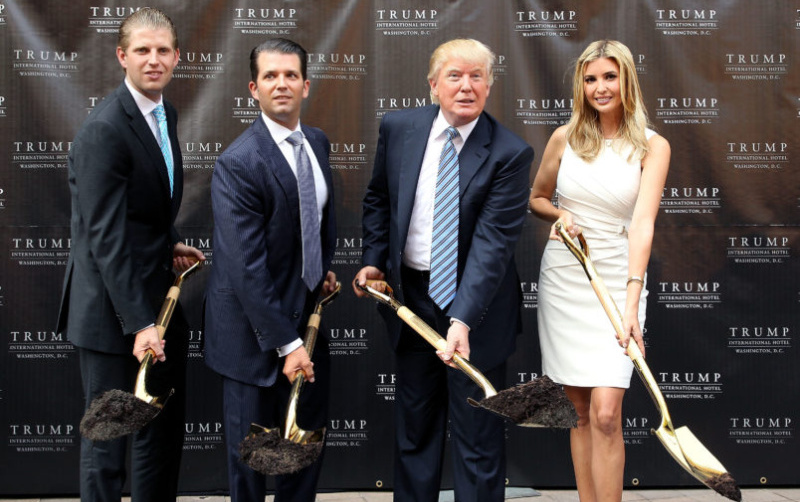L to R: Eric Trump, Donald Trump Jr., Donald Trump, and Ivanka Trump break ground at the Trump International Hotel, Washington, D.C., July 23, 2014 (Paul Morigi/WireImage)
Donald Trump and his advisors have moved millions of dollars from campaign donors into the Trump Organization.
Trump’s re-election campaign has transferred about $2.8 million of donor money into the Trump Organization, including at least $81,000 since Trump lost the election. A joint campaign-Republican fundraising committees has shifted about $4.3 million into Trump business, including $331,000 after the November vote.
The money has been moved in the guise of rent, airfare, lodging, and other expenses.
For example, on November 5, two days after the election, the joint fundraising committee paid $11,000 to the Trump Organization’s hotels, and a week later another $294,000 was put into the hotels to rent space, order catering, and pay for rooms. On November 19 and 24, a total of $70,000 for air travel was paid to DT Endeavor LLC, which appears to be a Trump company.
The total of post-election transfers to Trump’s businesses was $413,000 or $484,000 if DT Endeavor is included.
Trump proclaimed when he became President in 2017 that there would be no conflicts of interest with his business, but refused to distance himself from the Trump Organization or the trust from which he is a beneficiary.
The Organization billed taxpayers for high-priced use by Government entities of Trump properties, including rooms for the Secret Service and the Trump entourage during his numerous stays at his Mar-a-Lago resort in Florida. According to ProPublica, at $16.1 million was moved into Trump hotels, golf courses, and restaurants by the Trump campaign, GOP organizations, and Government agencies from June 2015 to June 2018.
Two weeks ago, the Supreme Court declined to consider whether Trump violated the Constitution provision that bars a President from profiting from a foreign government.
The court refused to hear the two cases about the “emoluments clause”, with lower court opinions that ruled against Trump, because he is no longer in office.
One case argued that Trump violated the Constitution by accepting payments from foreign and domestic governments through the Trump International Hotel in Washington D.C., putting competitors at a disadvantage.
A second case was brought by members of the hospitality industry who own or work in hotels or restaurants in New York and Washington, also arguing that they were disadvantaged.


Trackbacks/Pingbacks